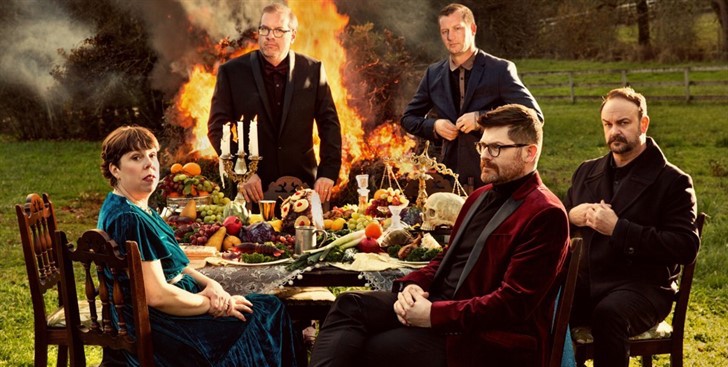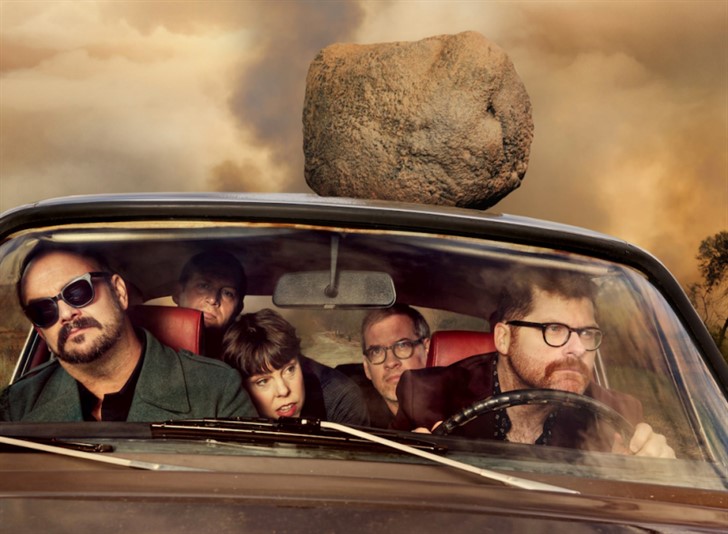The Decemberists: Laughing at the Apocalypse

“Every time you make a record, you want it to be something new and fresh,” The Decemberists’ Colin Meloy says as he surveys the origins of his band’s first full-length LP in three years, I’ll Be Your Girl. “Sometimes you want it to be a new direction; other times, you just want to improve on what you’ve done before. With this one, we were more open to the idea of taking a complete left turn.”
When the band announced I’ll Be Your Girl in mid-January and shared the first single, “Severed,” longtime fans may have been forgiven for being taken aback at the song’s unfamiliar feel. In a decidedly non-Decemberists fashion, the single opens with a pulsing synthesizer ostinato that’s quickly accompanied by a rumbling bassline and sharp drums. This isn’t your older sister’s Decemberists—and that’s the point.
Since the Portland, Ore.-based group debuted just after the turn of the millennium, their brand of indie-rock, imbued with storytelling and whimsy, has become a staple of the Pacific Northwest music scene. (Frontman Meloy even appeared in an episode of IFC’s Portlandia as part of a band that embodied that indie-hipster scene.) But with I’ll Be Your Girl, it was high time for a change.
“We could have kept making records with [producer and engineer] Tucker Martine forever,” Meloy admits. “He’s a close friend, almost like another member of the band sometimes, and he’s a joy to work with, so certainly no complaints there. But in order to explore new territory, we needed to create obstacles for ourselves, and one obstacle would be to remove that comfort zone of working with Tucker and setting up an environment where we would be forced to make different decisions.”
Enter producer John Congleton, whose résumé includes recent work with St. Vincent, Blondie, Angel Olsen, Future Islands and more. Meloy says he chose the producer “because he seemed like a guy you could hang out with 10 hours a day for five weeks,” and also because of the band’s admiration for Congleton’s previous work.
“I felt like his aesthetic was a bit of a 90-degree turn from what we had been doing,” Meloy says, quickly citing Congleton’s collaborations with Swans and Chelsea Wolfe, along with his work
on Wye Oak’s 2011 album Civilian. “There’s a brokenness to the records he’s worked on—a positive brokenness. The St. Vincent stuff has an angularness to it that almost feels like it’s on the verge of cracking apart.”
The real point of the producer change, though, was Meloy’s desire to set out on another path with his band, something that Congleton had actually already foreseen when he was offered the job. However, he wasn’t holding his breath about the group’s willingness to make real changes in their approach.
“Everybody says that,” Congleton says with a laugh. “Then they get in there, and their backs tighten up whenever things sound weird. But sometimes, just having a new perceptive opinion changes things enough.”
Congleton’s former band The Paper Chase and The Decemberists were actually on same label, Kill Rock Stars, for years and had a number of mutual friends, yet they had never met. For his part, Congleton was a fan of the band, and he praises Meloy’s ability to craft a song.
“I always had extreme reverence for Colin’s songwriting, and the band itself is really, really good,” he says. “Everyone in the band is very capable, and everyone plays with a lot of agility—you don’t hear that quite as much anymore in other groups. What a dynamo crew.”
Before Congleton and the band entered the studio, he and Meloy chatted on the phone about the direction of the album and ultimately came to the decision that the pairing was a good fit. Congleton also notes that Decemberists guitarist Chris Funk, who he calls a “brother in weirdness,” was a vocal proponent of working with the producer.
“We just started talking about reference points,” Meloy remembers, citing his early conversations with Congleton about their shared love of Roxy Music and Brian Eno. “When you have a blank canvas, it’s fun to throw around those sorts of reference points. Like, here’s the song—but what would it sound like if Roxy Music was doing it? You aren’t Roxy Music, so it’s not really going to sound like Roxy Music, but if you could just put yourself in that mind-set, you’re going to push yourself somewhere different.”
“I had an inkling that they might be in a situation where they were too comfortable, having made a series of records with Tucker,” Congleton says. “I also feared that they might be too far down a path of where they couldn’t see anything different about their band, but I think Colin had come to that conclusion and was ready for at least a fresh opinion. But he was also pretty clear that he might push back quite a bit, like, ‘I want a fresh opinion, but I need somebody that understands that I might kick and scream a bit.’ And that’s OK; I’m pretty used to that. I told Colin that as long as the songs were good, we’d be fine. And he delivered a batch of good songs.”
For the first time in years, The Decemberists also decided to road test their latest ideas. In addition to the hiatus they took between 2011’s The King Is Dead and 2015’s What a Terrible World, What a Beautiful World, the band hadn’t toured in between record cycles for over a decade.
“This might’ve been the first time we were actually playing new songs live since [2005’s] Picaresque,” Meloy says. “It was an interesting opportunity— informative, if nothing else. When we’re on our own on the road, I think we’re more apt to fall into arrangements that feel comfortable and fit right in with the current—you’re not liable to make any radical changes when you’re shoehorning a new song into a set. It wasn’t until we got into the studio that we felt like we had the freedom to really mess with these things and see what happens if we try a completely different tack. In most cases, we almost completely abandoned the arrangement we had come up with on the road. Once we started recording, the real excitement was in tearing everything down and rebuilding it.”
Meloy and the band’s willingness to change their view on the new songs was something that Congleton recognized and appreciated—these guys weren’t just paying lip service to the “new direction” idea; they were embracing it.
“Colin’s a real artist, you know, so for him, the best idea wins,” Congleton explains, citing album tracks “Once in My Life,” “We All Die Young” and aforementioned single “Severed” as ones that took an especially different direction in the studio.
“A great example is ‘We All Die Young,’” Meloy agrees, noting that the tune had originally been conceived as a “kind of wild and wooly, early-‘70s Leonard Cohen song” and had evolved on tour into a “bluesy ramble,” which wasn’t exactly inspiring the band. “By the time we got it into the studio, I don’t think anybody was interested in committing to that arrangement—nobody was really excited about it, but we thought it was a good song. It was John’s suggestion—he said, “Why don’t we make it a Jock Rock song?”
Suggesting that a band of indie musicians adopt an ethos akin to Gary Glitter’s unofficial sports stadium theme “Rock and Roll Part 2” (aka “The Hey Song”) may seem like a stretch, but Congleton and Meloy were both open to the seemingly left-field proposition, and the resulting tune, while unexpected on a Decemberists LP, has an undeniable catchiness and dirty glamor to it. Congleton says he aimed to turn the song into “something that you could imagine being screamed at a festival.”
“But, of course, what makes that interesting is that it’s maniacal and nihilistic,” he continues, referencing the song’s title and lyrics. “It ticks the boxes of a jock jam, but it’s just fucked up enough to where it feels new.”

Songs like “We All Die Young” and “Severed” are notable in I’ll Be Your Girl not just because of their feel, but specifically because of their lack of acoustic guitar, the instrument around which most of The Decemberists’ catalog had been previously based.
“I don’t even know if I told Colin this, but one of the things I hoped to do—and I know Chris was definitely feeling the same way—was to frame it slightly differently, to where it’s not always the acoustic guitar,” Congleton admits. “And I think we absolutely nailed that on the record.”
“I can tend to be overprotective about parts that I’ve become connected to,” Meloy confesses. “And when you write all your songs on an acoustic guitar, jettisoning that can be kind of a terrifying process. All of a sudden, the thing that you based the whole song around is gone, and you’re just sort of floating a little bit. But in the end, I think it’s in the best interest of the music.”
Diehard fans of The Decemberists’ sound still won’t be disappointed with I’ll Be Your Girl, however. Despite the outliers and general toning- down of the acoustic guitar, many tracks on the album feel like they could have a spot on a number of previous Decemberists LPs.
The two-part “Rusalka, Rusalka / The Wild Rushes,” which moves from morose, piano-driven dirge to harmony-infused folk-rock, is classic sullen storytelling from Meloy, and it also points to another aspect that The Decemberists didn’t leave behind on the record: their undying love for castaways and cutouts. Though, this time around, there’s an especially dichotomous approach—what Meloy calls “exuberant nihilism.”
The term is encapsulated in the song “Everything Is Awful,” which pairs bouncy, jubilant sections with cathartic bursts of energy and lyrics like “What’s that crashing sound/ Follows us around/ That’s the sound of all things good breaking.”
“If anything, what was drawing these songs together was a dreamlike psychedelia that was sort of cynical in nature,” Meloy summates. “The songwriting was coming out of a place of dismay and a good helping of hopelessness. It’s all pretty dark—not rare for a Decemberists record.
“But there’s a kind of exuberance—almost like a fatalism—that we’re in this slow-moving car crash, and ‘Let’s just enjoy the time we have left.’ I don’t want to have it be a record full of rants without any kind of answers, but I think that’s all we have in us right now: just a world of ranting. So this is just me ranting at a time when people are pissed off, trying to find their voice and wanting to have their voice heard—and laughing at the apocalypse a little bit, because that’s all we have left.”
This article originally appears in the April/May 2018 issue of Relix. For more features, interviews, album reviews and more, subscribe here.



















